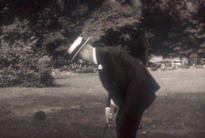4. RE-ENACTEMENT/REANIMATION
SCREENING
Situation Leading to a Story
Matthew Buckingham
16 mm. | 00:21:00 | b&w
sound
If private life might be defined through the time or space in which people cannot be considered as images, Matthew Buckingham explores the remarkable attempts of amateur filmmakers to create an image of their privacy in his found-footage film. The film evokes and questions the privilege of anonymity when watching one another’s home movies, by literally bringing to the light what was meant to stay private and hidden. The image is resituated in a tension between the viewer and the maker, a place where it is more, as well as less, than itself.
The Battle of Orgreave
Mike Figgis
16 mm. | 00:60:00 | col.
sound
This film is based on a re-enactment of the ‘Battle of Orgreave’, a violent streak during a miners’ strike in South Yorkshire in 1984. Combining images of the interpretation, authentic pictures and testimonials this film moves between public and private cultures, on the lookout for discrepancies between the reporting of the British media and the hidden values surrounding the strike.
Symbionese Liberation Army (SLA)
Sharon Hayes
video | 00:10:00 | col.
sound
In 1974 the U.S. is alarmed by the kidnapping of Patty Hearst, by a radical political organisation calling itself Symbionese Liberation Army (SLA). During her captivity Patty Hearst made four audiotapes, in which she addressed her parents. On the last tape she referred to herself as Tania and she announced she was going to join the SLA. During the beginning of the years 2000 Sharon Hayes carried out several re-enactments of the recording of those tapes. During the performances she memorised part of the lines, asking the audience to correct her where necessary. Hayes creates a space in which no distinction is made between the re-enactment of an event and its execution in the present, accentuated by the cracks in the human memory.
I’m The Man You Think You Are
Marc Robinson
video | 00:06:00 | col.
sound
In I’m The Man You Think You Are – a sentence borrowed from Malcolm X –Robinson investigates the mythology of the Afro-American leader in an interaction with his statue. Robinson creates an ambiguous dialogue with the icon, raising fundamental issues about the image, the self and its reflection, and the way in which the representation of historical figures and events is constituted. In the end both the identity of the image of Malcolm X and the identity of the artist himself, along with the way he relates to the political position of the icon, are modelled.
Matthew Buckingham
16 mm. | 00:21:00 | b&w
sound
If private life might be defined through the time or space in which people cannot be considered as images, Matthew Buckingham explores the remarkable attempts of amateur filmmakers to create an image of their privacy in his found-footage film. The film evokes and questions the privilege of anonymity when watching one another’s home movies, by literally bringing to the light what was meant to stay private and hidden. The image is resituated in a tension between the viewer and the maker, a place where it is more, as well as less, than itself.
The Battle of Orgreave
Mike Figgis
16 mm. | 00:60:00 | col.
sound
This film is based on a re-enactment of the ‘Battle of Orgreave’, a violent streak during a miners’ strike in South Yorkshire in 1984. Combining images of the interpretation, authentic pictures and testimonials this film moves between public and private cultures, on the lookout for discrepancies between the reporting of the British media and the hidden values surrounding the strike.
Symbionese Liberation Army (SLA)
Sharon Hayes
video | 00:10:00 | col.
sound
In 1974 the U.S. is alarmed by the kidnapping of Patty Hearst, by a radical political organisation calling itself Symbionese Liberation Army (SLA). During her captivity Patty Hearst made four audiotapes, in which she addressed her parents. On the last tape she referred to herself as Tania and she announced she was going to join the SLA. During the beginning of the years 2000 Sharon Hayes carried out several re-enactments of the recording of those tapes. During the performances she memorised part of the lines, asking the audience to correct her where necessary. Hayes creates a space in which no distinction is made between the re-enactment of an event and its execution in the present, accentuated by the cracks in the human memory.
I’m The Man You Think You Are
Marc Robinson
video | 00:06:00 | col.
sound
In I’m The Man You Think You Are – a sentence borrowed from Malcolm X –Robinson investigates the mythology of the Afro-American leader in an interaction with his statue. Robinson creates an ambiguous dialogue with the icon, raising fundamental issues about the image, the self and its reflection, and the way in which the representation of historical figures and events is constituted. In the end both the identity of the image of Malcolm X and the identity of the artist himself, along with the way he relates to the political position of the icon, are modelled.
Dit evenement is onderdeel van Tanya Leighton - In The Poem About Love You Don’t Write The Word Love

-
wo 19.10.2005
22:15 - 23:45 -
Praktische info
Location:
Filmmuseum
Ex Shell-Building
Ravensteinstraat 60
1000 Brussel - Kunstenaars